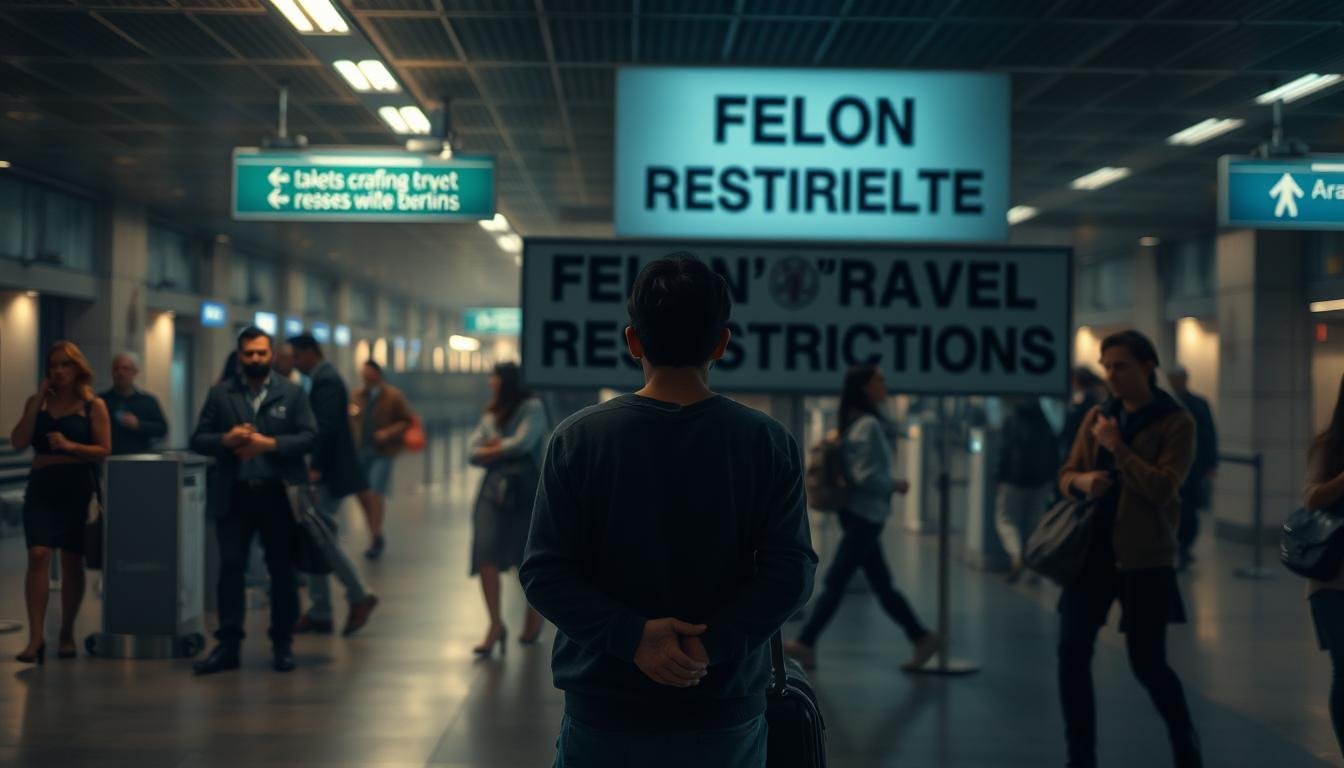Can Felons Leave the Country? If you have a felony record, you might wonder about international travel. It can be complex, with certain restrictions.
There are specific felon travel restrictions that might limit your international travel. It’s important to understand these restrictions and the legal framework they’re based on. This knowledge is key for planning your trip.
This article will cover the legal tips and restrictions for traveling abroad with a felony record. You’ll learn about the requirements and challenges you might encounter during your travels.
Contents
- 1 Understanding Travel Restrictions for Felons
- 2 Can Felons Leave the Country? Legal Framework Explained
- 3 Passport Considerations for Convicted Felons
- 4 Probation and Parole Travel Restrictions
- 5 How Different Types of Felonies Affect Travel Rights
- 6 Country-Specific Entry Restrictions for Felons
- 7 Record Expungement and Its Impact on International Travel
- 8 Legal Documentation and Preparation for International Travel
- 9 Practical Tips for Legal International Travel with a Felony
- 10 Conclusion: Navigating International Travel with a Felony Record
- 11 FAQ: Can Felons Leave the Country?
- 11.1 Can a felon travel outside the United States?
- 11.2 How do I know if my felony conviction affects my ability to travel internationally?
- 11.3 Can I obtain a passport if I have a felony conviction?
- 11.4 What are the travel restrictions for individuals on probation or parole?
- 11.5 How can I improve my chances of being allowed to travel internationally with a felony conviction?
- 11.6 What is the process for obtaining a temporary resident permit for a country with entry restrictions?
- 11.7 Can I travel to countries with strict entry requirements if I have a felony conviction?
- 11.8 How does the type of felony conviction impact international travel?
- 11.9 What documentation should I prepare before traveling internationally with a felony conviction?
- 11.10 Are there any specific tips for felons planning to travel internationally?
Understanding Travel Restrictions for Felons
Traveling abroad after a felony conviction can be tough. A criminal record can limit your travel options. It’s key to know the rules for felons traveling abroad.
The type of felony matters a lot. Crimes like drug trafficking or terrorism can mean stricter rules. These crimes often lead to harsher travel restrictions.
Where you’re from also plays a part. Countries have different rules for felons. Some might not let you in, while others need more paperwork or have special rules.
Being on probation or parole adds more hurdles. You might face extra rules for traveling, both at home and abroad.
| Factor | Impact on Travel | Examples |
|---|---|---|
| Type of Felony | Affects eligibility for international travel | Drug trafficking, terrorism, crimes involving moral turpitude |
| Jurisdiction | Varying entry policies for felons | Country-specific restrictions, additional documentation required |
| Legal Status | Additional travel restrictions | Probation, parole, court-ordered travel restrictions |
Before you plan to travel abroad, check the rules for your case. Talking to a lawyer can help understand if you can travel.
Can Felons Leave the Country? Legal Framework Explained
Felons can travel abroad, but it’s not easy. The U.S. Department of State decides who gets a passport. They look at each case carefully.
Felons must tell about their crime when they apply for a passport. The Department of State checks each application. They look at the crime, when it happened, and if the person is on probation or parole.

Some felonies stop you from getting a passport. But, having a felony doesn’t mean you can’t get one. It just makes it harder.
Key Factors in Passport Issuance for Felons
| Factor | Description | Impact on Passport Issuance |
|---|---|---|
| Nature of the Felony | Type of crime committed | Serious crimes may lead to denial |
| Date of Conviction | Time elapsed since conviction | Recent convictions may be viewed more critically |
| Probation/Parole Status | Current legal supervision status | Being on probation or parole can restrict travel |
Knowing these points is key for felons wanting to travel. A felony can make getting a passport hard. But, it’s not the only thing that matters.
Other rules, like being on probation, can also stop you from traveling. So, felons need to check their passport eligibility carefully. They must follow all rules to avoid trouble when traveling abroad.
Passport Considerations for Convicted Felons
If you’re a convicted felon, getting a passport for international travel is key. First, you need to gather the right documents. You’ll need proof of citizenship, identification, and a copy of your ID’s front and back.
Documentation Required for Appeals, Success Rates and Timeframes
To apply for a passport as a felon, you must submit:
- Proof of U.S. citizenship (birth certificate or naturalization certificate)
- Valid photo ID (driver’s license or government-issued ID)
- Completed Form DS-11
- Proof of travel plans (flight itinerary or hotel reservation)
If your application is denied, you can appeal. You’ll need to provide more documents, like a court order or proof of rehabilitation. Success rates depend on your case and where you are. [Can Felons Leave the Country?]
Getting a passport can take weeks to months. Routine service takes 8-11 weeks, while expedited service is 5-7 weeks. Apply early to avoid travel delays.
| Service Type | Processing Time |
|---|---|
| Routine | 8-11 weeks |
| Expedited | 5-7 weeks |
| Expedited at Agency | Same-day or next-day |
Knowing what you need can help you get a passport. This way, you can travel internationally without issues. [Can Felons Leave the Country?]
Probation and Parole Travel Restrictions
Knowing your probation or parole terms is key if you want to travel abroad with a felony conviction. Being on probation or parole limits your international travel. The court or parole board sets these rules.
People on probation or parole usually face strict travel restrictions. These can limit how far you can go from home, require you to stay in a certain area, or ban international travel. To go abroad, you might need special permission.
| Travel Restriction Type | Description | Permission Required |
|---|---|---|
| Local Travel Restrictions | Limited to a specific county or state | No |
| National Travel Restrictions | Allowed within the country but not internationally | Yes, for international travel |
| International Travel Restrictions | Prohibited from leaving the country | Yes, special permission needed |
To travel internationally, ask your probation or parole officer for permission. You’ll need to share your travel plans, like where you’re going and how long you’ll stay. Following your probation or parole terms is crucial to avoid legal trouble.

How Different Types of Felonies Affect Travel Rights
The type of felony you have can really impact your travel plans. Felonies are classified differently in each place. These classifications are key in figuring out travel rules.
Felonies are split into violent and non-violent crimes. Violent felonies, like assault or robbery, lead to tighter travel rules. Non-violent crimes, like fraud or drug possession, have less strict rules.
How a felony is classified also changes by place. For example, some states group felonies into Class A, B, or C. Each group has different penalties and travel rules.
- Non-violent felonies might let you travel more freely, depending on where you are and your conviction details. [Can Felons Leave the Country?]
- Violent felonies usually mean tighter travel rules. You might need special permission or have to follow strict travel terms.
- Drug-related felonies can have special rules. Some countries won’t let you in if you’ve been convicted of a drug crime.
It’s important to know these differences if you plan to travel abroad. Talk to a lawyer to understand how your felony affects your travel rights.
Also, laws about felonies and travel vary a lot between countries. Some places won’t let you in if you’ve been convicted of a felony. Others might be more understanding.
| Felony Type | Typical Travel Restrictions | Jurisdictional Variations |
|---|---|---|
| Violent Felonies | Stricter travel restrictions, potential denial of entry | More severe penalties in some jurisdictions |
| Non-Violent Felonies | Variable restrictions, potentially less severe | Some jurisdictions offer more leniency |
| Drug-Related Felonies | Country-specific entry restrictions | Stricter regulations in countries with strict drug laws |
Country-Specific Entry Restrictions for Felons
If you’re a felon planning to travel abroad, knowing the entry restrictions is key. Different countries have different rules for people with felony convictions.
Before you travel, research the entry needs for your destination. Some countries won’t let felons in. Others might need extra papers or have special rules. [Can Felons Leave the Country?]
Canada, for example, is strict about letting people with criminal records in. If you’re going to Canada, you might need a Temporary Resident Permit or to go through the Criminal Rehabilitation Process.
Temporary Resident Permits, Criminal Rehabilitation Process
A Temporary Resident Permit lets you into Canada if you’re not supposed to be there because of a crime. It’s good for a set time and can be renewed.
The Criminal Rehabilitation Process is a longer-term fix. It lets you into Canada without needing a permit. You must wait a certain time after your sentence ends.
| Country | Entry Restrictions for Felons | Additional Requirements |
|---|---|---|
| Canada | Strict entry requirements for individuals with felony convictions | Temporary Resident Permit or Criminal Rehabilitation |
| Australia | Character test for visa applicants with criminal records | Provide detailed information about past convictions |
| United Kingdom | Automatic refusal for certain serious offenses | Discretionary decision for lesser offenses |
It’s not just Canada; countries like Australia and the UK also have rules. Australia, for instance, checks if you’re of good character for visas. If you have a big criminal record, you might fail.

Knowing about these rules and processes is vital for felons traveling abroad. Always check with the embassy or consulate of your destination for the latest info.
Record Expungement and Its Impact on International Travel
Getting your record expunged can greatly affect your ability to travel internationally. If you’re a felon wanting to travel abroad, knowing how expungement affects your travel rights is key. [Can Felons Leave the Country?]
Expungement means sealing or erasing your criminal record. This can greatly impact your international travel, as many countries have strict rules for those with felony convictions.
- It can increase your chances of getting a passport, as some restrictions are lifted.
- It may make it easier to get visas for countries with strict entry rules.
- It can reduce the chance of being denied entry at border control.
| Country | Entry Requirements for Felons | Impact of Record Expungement |
|---|---|---|
| United States | Strict requirements for felons traveling abroad | Expungement can ease travel restrictions |
| Canada | Felonies can result in denied entry | Expungement may improve chances of entry |
| Australia | Character requirements can affect entry | Expungement can positively impact character assessment |
In conclusion, getting your record expunged is crucial for regaining your international travel rights. It’s important to understand the process and its effects on your travel plans. By expunging your record, you can greatly improve your chances of traveling abroad without restrictions.
Legal Documentation and Preparation for International Travel
Traveling internationally as a felon is more than just booking a flight. You need to get your legal documents in order. Having the right documents is key for a smooth trip.
First, check your passport’s status. If it’s expired or soon to expire, renew it right away. Some countries won’t let you in if your passport isn’t valid for at least six months after you leave.
Legal documentation for felons also means getting any needed visas for your destination countries. Start researching visa needs early, as the application process can take time.
- Find out if your destination has special rules for people with felony convictions.
- Collect any documents you might need, like court records or proof of rehabilitation.
- Apply for visas and other travel documents on time.
It’s also vital to understand the laws of your destination. Some places have strict rules for people with criminal records. Learning about these laws can help avoid trouble during your trip.
Lastly, think about talking to a lawyer who knows about travel rights for felons. They can give you advice tailored to your situation. This ensures you’re ready for your journey.
By following these steps, you can have a trouble-free international trip. Getting ready properly is the best way to avoid legal problems abroad. [Can Felons Leave the Country?]
Practical Tips for Legal International Travel with a Felony
If you’re a felon wanting to travel abroad, knowing the right tips and laws can help. It’s key to grasp the legal side and get ready for your trip.
First, look into the entry rules of your destination country. Some places don’t let felons in. Start by visiting the official government website of your chosen country.
It’s also important to know your legal standing. Check if your felony is considered spent or if you’re still on probation. This can really affect your travel plans.
- Consult with a legal professional to understand your travel rights and any restrictions.
- Ensure you have all necessary legal documentation, including a valid passport and any required visas.
- Be prepared to disclose your felony conviction when applying for visas or upon entry to another country.
| Tip | Description | Benefit |
|---|---|---|
| Research Destination Country | Check entry requirements for felons | Avoid travel complications |
| Understand Legal Status | Know if your felony is spent or if you’re on probation | Plan travel accordingly |
| Consult Legal Professional | Get advice on travel rights and restrictions | Make informed travel decisions |
By following these tips and understanding the laws, you can have a smooth trip. Enjoy your journey abroad.
Traveling internationally with a felony record needs careful planning. You must think about the type of felony, any probation or parole rules, and the entry rules of the country you’re visiting.
To travel abroad successfully, make sure you have the right legal papers, like a valid passport. Also, follow any court rules you must stick to. Getting your record expunged could make traveling easier.
Being well-informed and ready can help you deal with the hurdles of traveling as a felon. Learn about your destination, its laws, and take steps to avoid problems on your trip.
See Also: Can Felons Go to a Shooting Range? Know the Rules First
FAQ: Can Felons Leave the Country?
Can a felon travel outside the United States?
It depends on the felony type, jurisdiction, and legal status. Felons might face travel limits. Some countries won’t let in those with felony convictions. [Can Felons Leave the Country?]
How do I know if my felony conviction affects my ability to travel internationally?
Check your conviction and the laws of your destination. Some countries have strict rules for felons. You might need a special permit or to prove you’ve changed.
Can I obtain a passport if I have a felony conviction?
Having a felony doesn’t always stop you from getting a passport. But, you might need extra documents. Your application could be reviewed closely.
What are the travel restrictions for individuals on probation or parole?
If you’re on probation or parole, you might need permission to travel abroad. Talk to your officer to know your travel rules. [Can Felons Leave the Country?]
How can I improve my chances of being allowed to travel internationally with a felony conviction?
Consider getting your record expunged. It might ease travel limits. Also, research your destination’s rules and prepare all needed documents.
What is the process for obtaining a temporary resident permit for a country with entry restrictions?
The process varies by country. You’ll need to apply and provide documents like proof of rehabilitation or a valid travel reason.
Can I travel to countries with strict entry requirements if I have a felony conviction?
Yes, but you must know the country’s rules. You might need a temporary permit or to prove you’ve changed.
How does the type of felony conviction impact international travel?
The type of felony greatly affects travel. Some countries have strict rules for violent or serious crimes.
What documentation should I prepare before traveling internationally with a felony conviction?
Gather a valid passport, proof of rehabilitation, and any visas or permits needed. This ensures a smooth trip. [Can Felons Leave the Country?]
Are there any specific tips for felons planning to travel internationally?
Yes, research your destination’s laws and any travel limits. Prepare all necessary documents to avoid problems.

Van Maldonado, born in California, holds a degree in Criminology and Police Science. Currently serving as an investigative officer at a local police station, he spends his leisure time writing insightful content for FelonScope.com.

